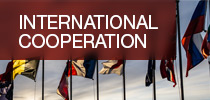Stories from UNODC Southern Africa
Malawi: Cervical Cancer screening reaches 446
 |
Staff from the Ministry of Health speak to prison staff and inmates about cervical cancer in Malawi during a UNODC-supported national screening initiative
LILONGWE, MALAWI - An initiative supported by the United Nations Office on Drugs and Crime, involving the Ministry of Health and the Malawi Prison Service, to screen female inmates, prison staff and spouses of prison staff for cervical cancer reached 446 clients from 17 prisons, which accommodate female inmates. Of the 446 women screened, 197 of them were inmates.
The screening was conducted by certified staff from the Ministry of Health using Visual Inspection of cervix with acetic acid (VIA). Out of the total number of women screened, 11 were VIA positive and were treated on the spot. Four women were diagnosed with other gynaecological problems and were treated at Prison clinics while two others had lesions which needed specialist attention at the Central Hospitals and were referred for further treatment.
The screening had been planned to reach 1000 women within the Malawi correctional facilities. However, most female officers or spouses of officers did not turn up due to a myth associated with the screening. Some of the targeted women reported that they already underwent the procedure, while others were not eligible at the time due to normal biological processes. This was more common amongst female inmates.
The cancer screening initiative demonstrated that it is feasible to reach the underserved population, such as inmates with health services and rights that are equal to the general community as stipulated within Rule 24 of the United Nations Minimum Rules for the treatment of prisoners. Inmates that were screened appreciated the service and the cervical cancer district coordinators were very supportive.
A report produced after the screening has recommended the promoting of more awareness raising among the targeted beneficiaries to debunk myths to increase the uptake of services. The report also recommends proper coordination amongst ministries and partners for such successful initiatives.
International standards that include the Nelson Mandela Rules, support the provision of the same standards of health care available in community and health care services to prisoners free of charge and without discrimination. Similarly, the United Nations Rules for the Treatment of Women Prisoners and Non-custodial Measures for Women Offenders (the Bangkok Rules) encourage screening of all female prisoners for reproductive health related issues.
In 2003, the General Assembly of the United Nations called for increased attention to be devoted to the issue of women in prison, including the children of women in prison, with a view to identify the key problems and ways in which they could be addressed.
Stories from UNODC
- 2025-04-14 11:27:20.0 - Investing in child protection as a priority: Brazil launches the first-ever national strategy to protect children from violence, crime and drugs
- 2025-04-11 13:46:31.0 - Promoting peace, social reintegration and drug prevention through boxing in Mexico
- 2025-04-04 16:14:10.0 - Get back up and try again: the power of sports in violence and crime prevention
Press Releases
- 2025-04-07 08:55:48.0 - UNODC: new study shows forest crime converging with other types of organized crime, fueling harms to the environment, communities, and economy
- 2025-03-12 11:30:14.0 - UNODC: Opium prices in Afghanistan near historic peaks, mostly benefiting large-scale traffickers
- 2025-03-05 09:55:22.0 - UN Office on Drugs and Crime and Zero Project/ Essl Foundation announce new partnership for people with disabilities







